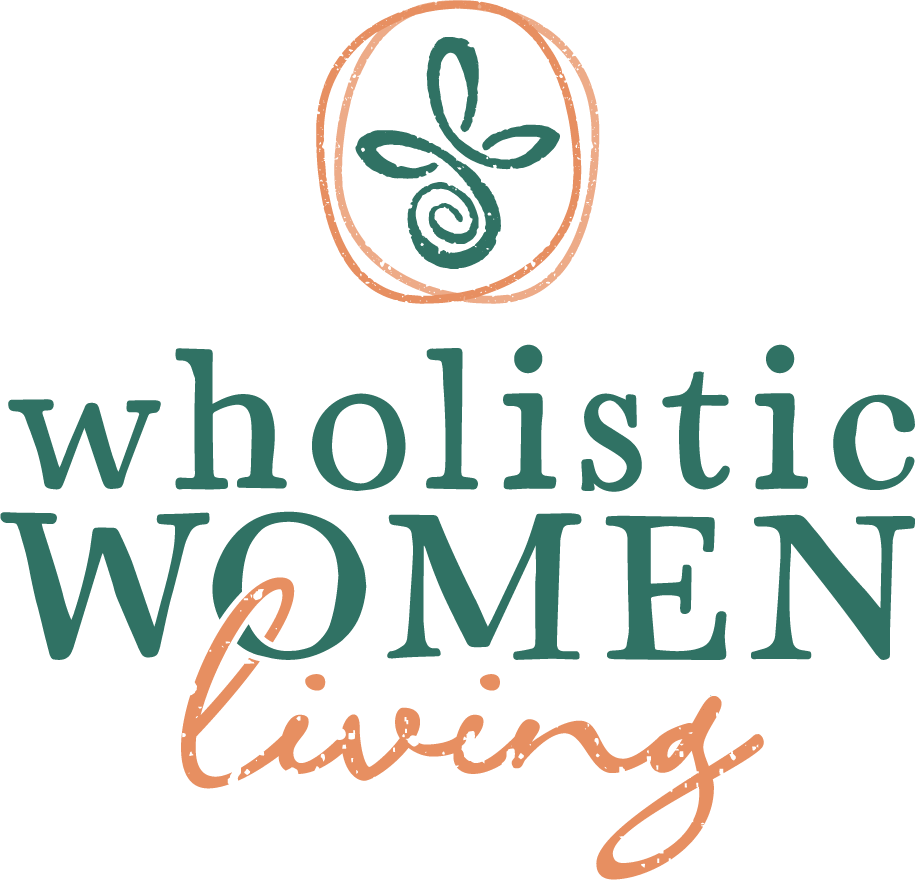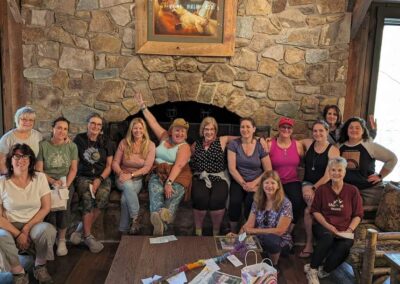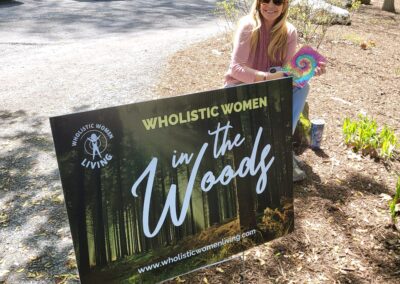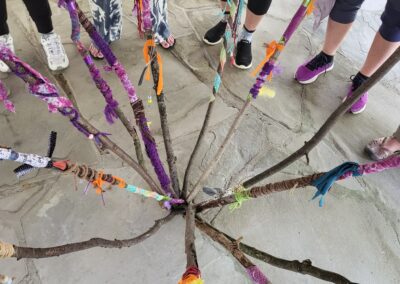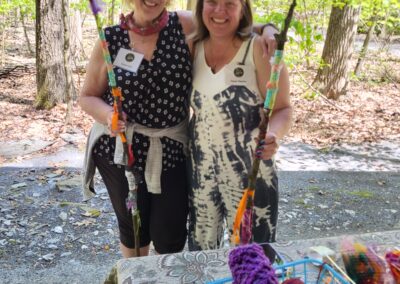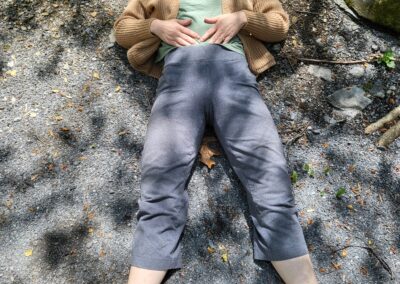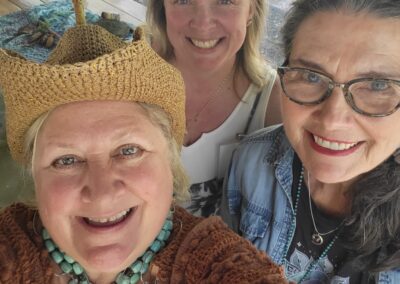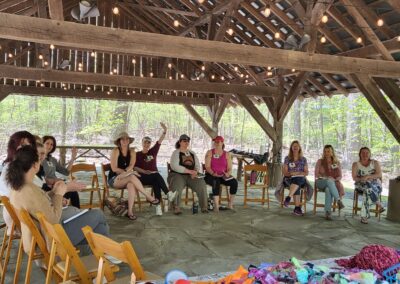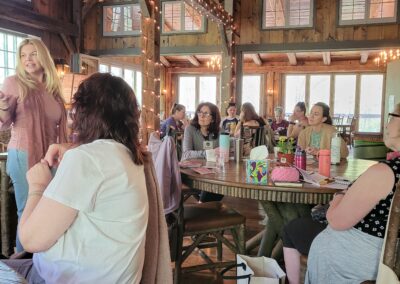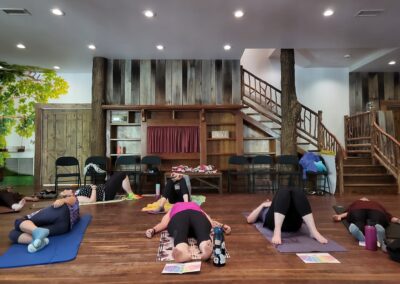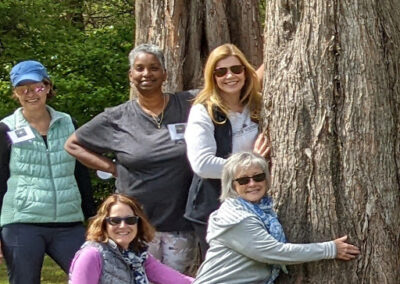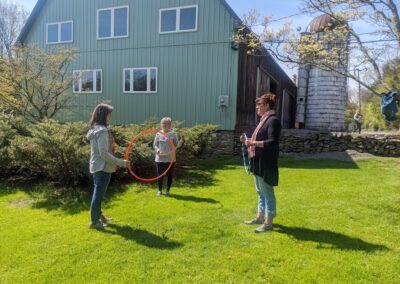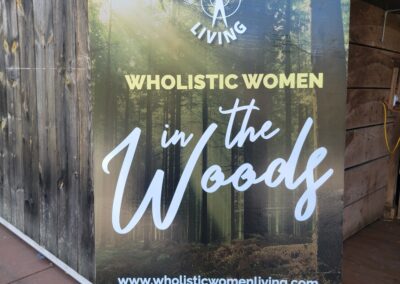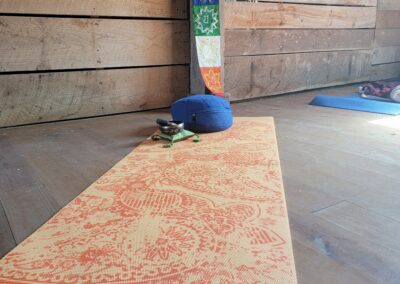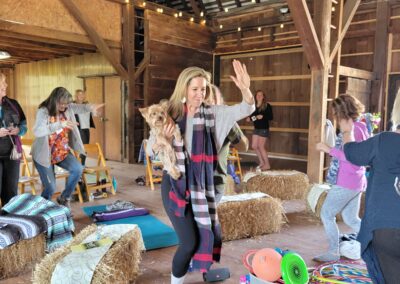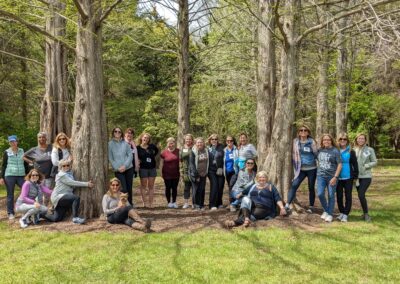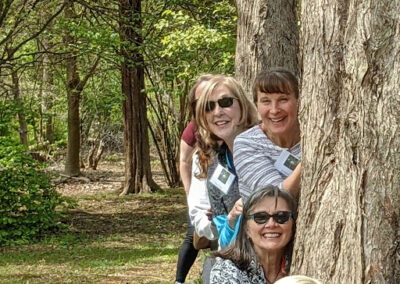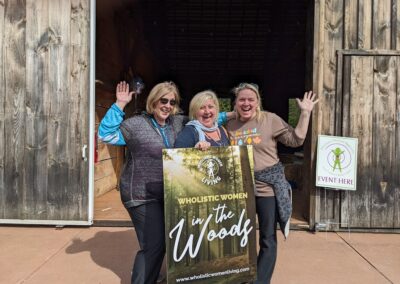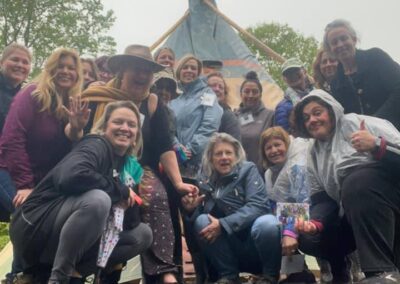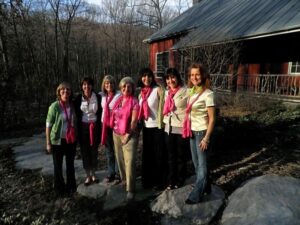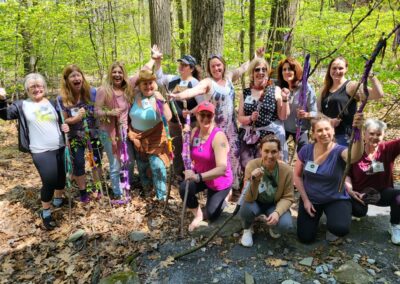by Casey Clark | Mar 22, 2022 | Change, Happiness, Personal Development, Retreats
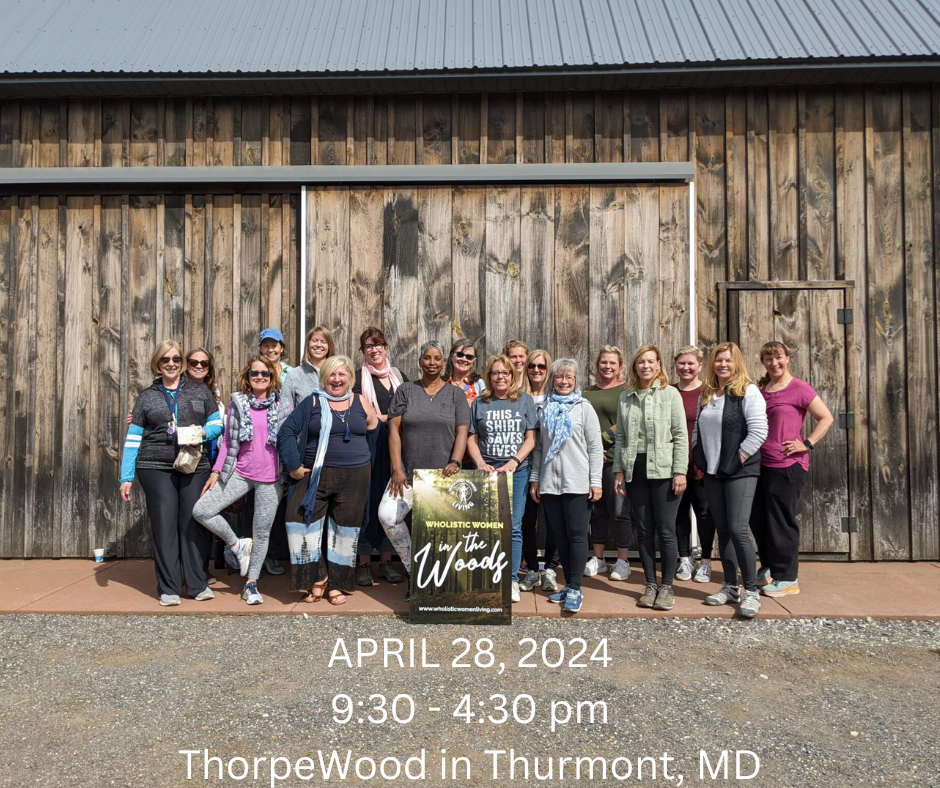
Our 3rd Annual Women in the Woods got us grounded in mother nature and bounced us forward into Spring. Our day retreat was filled with yoga dance, coach-led enrichment, healthy food, honoring nature with a grace walk, play and spirit-led crafting.
We explored well-being practices to nourish our heart, mind, body, spirit and welcomed the renewal and growth of spring with our Wholistic team, creating a day in nature like no other. Embarking on this journey of self-discovery and renewal together.
Some of the Women in the Woods had a few things to say:
“The retreat was a pitch-perfect celebration of nature, dance, writing, reflection, and play. All of this coupled with delicious food and the company of soulful women was an absolute delight.” Sheila Turybury
“Our team loved it. Thank you for everything. What a beautiful day filled with so many nice events.” Debbie Bennett
“What a wonderful Saturday with amazing women. Thank you Wholistic Women for putting together a fun, peaceful day in the woods. I left feeling refreshed and renewed.” Melissa Lentz
“I am so grateful that I signed up and have always loved all the Wholistic Women programs. There was something even more special with this event, being in ThorpeWood, a magical place, with a beautiful group of women. What a combination. I can’t wait to do it again.” Cindy Williams

by Kat Middleton | Sep 9, 2021 | Personal Development
Have you ever listened to yourself say “I’m not good enough to do _________________fill in the blank? Here are a few more
- Not pretty enough
- Not smart enough
- Too old
- Too young
- Too fake
- I don’t have what it takes
You get where I’m going with this.
“Going through life with self-limiting beliefs is like keeping your foot on the brakes when you’re trying to accelerate.” – lotuspathway.com
Messages like these can creep up on us for those out there who have an inner critic (and we all do). How do you think this affects our sense of self-worth? What is self-worth?
The Merriam-Webster dictionary defines self-worth as “a sense of one’s own value as a human being” and “a feeling that you are a good person who deserves to be treated with respect.” Having a sense of self-worth means that you value yourself primarily through your self-evaluated abilities and performance in your everyday activities-occupations. This is where we can be in our heads and start to hear the inner critic dish out some self-limiting beliefs. It can be anything from our appearance, class status, career status, bank account, social media following, technical abilities, etc. Guilt and shame have a sneaky way of showing up here.
It would help you to challenge the inner critic whispering, sometimes even shouting these things into your ear. Are the statements factual, kind, something you need to know? If not, no matter what is being said by the inner critic, stand in your sacred worthiness, claim what is rightfully yours to own and protect. Remind yourself in that very instant YOU ARE ENOUGH, SAFE, and a WORTHY PERSON. Once you understand, accept, and love yourself for all you indeed are, a true miracle, you will no longer depend on external factors to validate your self-worth. You will begin to appreciate yourself and bask in self-love and self-acceptance. You have the power; you have always had the power. Understand your self-value comes from the internal measure you set for yourself. Learning to love yourself is the greatest love of all. Thank you, Whitney!
“When you mark where your self-doubt is, then you can begin to conquer it.” – Stephen Richards.
“There is one grand lie-that we are limited. The only limits we have are the limits we believe.” -Wayne Dyer.
According to Brené Brown in the book, Dare to Lead, “A leader is anyone who takes responsibility for finding the potential in people and processes, and who has the courage to develop that potential.” That includes us. So, what is the single most crucial factor that distinguishes great leaders from the rest? Which personal quality is most likely to inspire confidence and respect among our fellow humankind? Which aspect of YOU should you focus on to put your life on the fast track to success? The answer to all these questions is a single word: ENERGY!
This is where the transformational energetic levels come in and can be a tool to help us measure and track what energy level we reside in and what our default energetic levels are. Let me explain. Bruce Schneider of the Institute for Professional Excellence in Coaching (iPEC) provides us a model with seven energetic levels in his book Energy Leadership. This helps us to become more aware of our personal and professional power. We will explore how to become an influential leader who motivates ourselves and others to reach our full potential. You will learn to recognize that the seven distinct levels are the key to understanding why everyone thinks and acts the way they do. Here are the seven levels:
1-The Victim
2-The Fighter
3-The Rationalizer
4-The Caregiver
5-The Opportunist
6-The Visionary
7-The Creator
The leadership of self and others starts and ends with these seven energetic levels. So, let’s see how you are showing up? Please join me for the next WWR+A event, either virtually via Zoom, or at Brewers Alley in person, on September 29, 2021, to learn more about energy, my signature WORTHY model, the energy leadership index assessment, and much, much more.
Today’s References
Book — Energy Leadership
Lyrics for The Greatest Love of All by Whitney Houston
What is Self-Worth, and How Do We Increase it?
Dare to Lead | PDF Book Summary | By Brené Brown.

by Donna Kettell | Jul 20, 2021 | Book Club, Goals, Personal Development
Does this sound familiar?….once I lose 15 pounds, I’ll be happy, or once I get a new job, or a new relationship, I’ll finally be happy? I think it’s human nature to think that there is a goal that we need to reach before we can allow ourselves to be truly happy. The issue with that is if we are constantly growing, there is always a new goal to reach. So that way of thinking is an endless cycle and we’re constantly postponing our happiness. That doesn’t sound like a fun way to live.
In his book The Happiness Advantage, Shawn Achor suggests that success does not lead to happiness. Rather, happiness leads to success. Think about that for a moment, doesn’t that feel empowering and inspiring? Imagine if you become more focused on seeking happiness, and then see those out-of-reach goals become more easily attainable. I love that formula. That led me to think about how I can personally be more intentional every day about embracing happiness. In his book, Achor outlines several principles that he believes will help us overcome obstacles, reverse bad habits, become more efficient and productive, make the most of opportunities, conquer our most ambitious goals, and fulfill our potential.
I recognized that I have been utilizing several of his strategies like meditation, affirmations, movement, and humor just to name a few. Achor also suggested strategies that I was not as consciously tapping into such as planning something to look forward to, conscious acts of kindness, and exercising a signature strength. The book does a great job of explaining how the strategies impact our brains and ultimately enhance our productivity, creativity, and achievement. The principles in this book reinforce topics that many of our Wholistic Woman Retreats + Academy coaches have shared with our members this year. It’s based on research from the positive psychology field, neuroscience, and Achor, a former Harvard lecturer and researcher who has appeared on one of my favorite shows, Oprah’s Super Soul Sunday series.
On Wednesday evening, July 28, we’ll have a virtual book club meeting to discuss Achor’s book, The Happiness Advantage. I hope to see you there, and hear how it has impacted you!

by Kat Middleton | Jun 21, 2021 | Happiness, Personal Development
What comes to your mind, or what do you think of when I say the word WATER?
When I was just a young girl of about 9-years old, my family moved overseas. Every weekend, all six of us would pile into the red and white VW Camper and travel to some new and exciting location in Italy. My dad usually took the scenic route along the coastline of the Mediterranean Sea. I can still recall the thrill and utter amazement of coming around a corner only to see the magnificent majesty of the deep blue sea, Breathtaking!
Water relaxes the mind, heals the body, soothes the heart, and calms the spirit! Water has always been an incredible source of healing for me; how about you?
Have you ever heard of Blue Mind Science? Is it the study of the aquatic environment’s health benefits? It offers up a cure for whatever ails you, whether it’s stress, anxiety, or just a case of the blues.
Humans are naturally drawn to water. That’s why most communities are built near bodies of water. Scientists are now quantifying the positive physical and cognitive effects of water. It turns out it leads to an improved overall sense of wellbeing and can produce a meditative state that makes us happier, healthier, calmer, creative, and more capable of AWE! And all for free!
Whether it’s going down to the ocean, visiting the local swimming pool, sitting in a jacuzzi, the smell of rain, a good thunderstorm, or spa service, water heals. Did you know the word SPA is an abbreviation for Solus Par Aqua, which means health or healing through water? Have you ever experienced a Vichy shower?
Now I would be remiss as an OT Practitioner and a Wholistic Empowerment Coach if I didn’t mention HYDRATION and its importance. Did you know that humans are approximately 70% water? Have you experienced any of the following?
• Dry skin
• Dry mouth
• Brain fog
• Moodiness
• Headache
• Muscle cramps
• Dizziness
• Rapid heart rate
These are all symptoms of dehydration:
Whether you choose to drink tap, spring, mineral, seltzer, purified, alkaline, vitamin, or well-water, so long as it is safe, the main goal is to stay hydrated and drink enough water each day to stay healthy and happy. Also, what is it they say about the fountain of youth? Why not stop for a spot of tea or pause this season for some delicious watermelon.
Some benefits of water are:
• Better heart health and overall health
• Increased energy and brain function
• Lubricated joints and more robust muscles
• Ease with digestion
• Maximized physical performance
And the list goes on. Water is therapeutic!
To you, it might just be water, but to me, it’s how I regain my sanity.
I want to end today’s blog with a quote by Sir George Sitwell.
“I have left almost to the last the magic of water, an element which owing to its changefulness of form and mood and color and to the vast range of its effects is ever the principal source of landscape beauty, and has like music a mysterious influence over the mind.”
— Sir George Sitwell, On the Making of Gardens
May you experience a wholehearted, wholistic sense of wellbeing, along with the Blue Mind happier, healthier, calmer, more creative, and capable of Awe, MAGIC OF WATER OFTEN!

by Carol deLaski | Jun 21, 2021 | Academy Programs, Personal Development
May I ask, where is your mind right now?
Are you focused on the words you’re reading or has your mind wandered somewhere else? If it has, don’t worry, you’re not alone.
Psychologists Matthew Killingsworth and Daniel Gilbert studied five thousand people and learned that about 50 percent of our time is spent thinking about something other than what we are doing. That means that only about half our time is spent in the present moment!
In addition, they found that 80 percent of the time we are thinking about something that is actually more stressful than what we are currently doing; which means we are often the originators of the very stress that we are trying to avoid!
Research shows that we are happiest when we are aware of what we are doing – even if what we are doing is unpleasant or boring. We tend to feel calmer when we are present for our activities rather than thinking about something else. Interestingly, our mental and physical well-being is improved when we are present regardless of whether our activity is exciting, boring, enjoyable, or unpleasant.
Why is that? Because when our mind wanders, we tend to go backward or forwards. We can easily play re-runs in our mind to process and perhaps even get stuck in ruminating over the past. Or we can fast forward trying to prepare for the future by pre-thinking, worrying, and even catastrophizing about what’s to come. You may notice that your mind wants to either race ahead to predict and prepare or look backward to process and integrate what already happened. Whether racing ahead or gazing behind…our minds seem to prefer anything other than the present!
Presence is defined as “being with another” or “in the immediate vicinity or proximity.” We know that the opposite of presence is absence. The curious thing about presence is that even though you could be physically present with someone right now, your mind could be somewhere else. This is not new information, yet our digital devices have radically increased the ability of our minds and bodies to be in different places at the same time.
Ideally, presence is a state of “receptive awareness” which helps us pay attention to what’s happening right now. It means being able to choose where and how we will intentionally focus our attention.
Being present and maintaining a sense of presence sounds like it should be easy, but it is challenging for many of us. We are easily distracted.
How do we achieve a ‘be here now’ lifestyle? What skills support us in being mindful and present? There are formal mindfulness practices to help us such as yoga, meditation, tai chi, qigong. And there are informal practices such as feeling the sun on your face, being fully engaged in a conversation with a child, pausing to enjoy the sunset, or a bird in flight. If it seems hard to you, start small. I recommend that you begin with your senses. Our bodies are the perfect tool to ground ourselves in the present moment. Pause to notice what you see, smell, taste, feel, and hear. Check in with your emotions to linger and savor them a moment longer than you usually do. Is that joy you’re feeling? Savor it. Are tears in your eyes? Treasure them. They connect to your heart. Notice what your body is telling you and let it guide you to the present moment.
There is good news; we can train our brains to be more present, and science proves it.
Since the 1970’s there has been a growing recognition of the benefits of mindfulness, which is another word for focused attention or presence. Findings show that mindfulness practices have an impact on the structure and function of the brain through what is known as neuroplasticity. Neuro refers to our neurons and plasticity describes the brain’s malleability in response to experience. It means our adult brains can be transformed by experiences. This is big news because prior to this information it was believed that our brains didn’t change after puberty. This is encouraging news for those of us who want to experience more presence.
The more we can inhabit a mental state of presence, the more likely it will become a familiar baseline. Then when we are under stress, we will more easily tap into that familiar capability. With intention…and attention…we can cultivate the ability to more readily connect to the people we are with, the activities that we do, and even to our own inner landscape.
Personally, the more I practice presence the more peaceful I feel. Don’t get me wrong, it’s not all sunshine, rainbows, and unicorns all the time but I can tap into a peacefulness even when stressful things are happening around me. I discover a sense of calmness when I focus on my breath and notice something to be grateful for at that moment.
I find that practicing presence leads me to an inner spiritual place. When I pause to notice my surroundings, attend to what I’m hearing, or really see what is before me, I’m often filled with gratitude. Appreciation seems to naturally flow from being present. Mindfulness leads me to feel God’s Presence and I can find my Self reflected in that mirror. I feel one with the Divine when I take time to slow down and be present for the experiences I am having.
When I more fully inhabit the body I’m in, feel the emotions I’m experiencing, and the breath I’m breathing, I am in the moment. Such connectedness with my inner and outer landscape draws me closer to the God of my understanding. Faith grows as I intentionally develop this muscle of connection and love.
I’m curious to know how you experience presence. How does it connect your heart, mind, body, and spirit? What does spiritual presence mean to you?
The next Wholistic Woman Retreat and Academy program on June 30th will discuss this topic. Be sure to check the details here and register.
References: M.A. Killingsworth and D.T. Gilbert, “ A Wandering Mind Is an Unhappy Mind,” Science 330, no 6006 (2010):932 The Gift of Presence, A Mindfulness Guide for Women by Caroline Welch

by Jane Helm | May 12, 2021 | Book Club, Personal Development
I have read Marie Forleo’s book, “Everything Is Figureoutable” twice, once because I loved the title and was intrigued. The second time was more recently, as I prepared for the Book Club meeting I am leading later this month. I am grateful for the main theme of this book that we have the power to figure out any challenges that may arise in our life!
As a Neurocoach, I work with my clients on mastering their mindset. This book is all about the mindset – the key to transformation! Our mindset is responsible for most of our success in life! It’s our core beliefs, thoughts, and emotions that drive our behavior and results. By embracing the core belief that we can figure out anything, we are creating thoughts of empowerment. By approaching our life with a “can do” attitude, we are setting ourselves up for success!
There are key concepts in this book that can elevate you to embrace the mindset of being able to figure out anything:
- The Magic of Belief: our beliefs are the main source of “why we do what we do.” By digging deep into your core beliefs and understanding which are serving you and which ones are holding you back is a pivotal exercise in approaching your life with a proactive mindset.
- Eliminate Excuses: we all have made excuses as to why we haven’t achieved something! Excuses are a result of our brain doing its job-keep you in safe and familiar territory! Beyond that, we have the ability to examine what our inner voice is saying. Is it saying, “I can’t?” or is it really saying, “I won’t?” Discriminating between these two phrases can add powerful insight as to how excuses may be holding you back.
- Dealing with Fear: As Marie states, “Fear is not the enemy. Waiting to stop feeling afraid is.” Fear is a natural emotion that dates back to our earliest days as humans. In those early days, fear kept us alive! Recognizing that fear is not our enemy, but a signal of something to pay attention to, to move us forward, inspiring us to act. Action is the anecdote to fear!
- Define Your Dream: What is it that you really want? In order to achieve any goal or dream, you need to clarify what that means and commit to it. Maire says, “You wouldn’t have the dream if you didn’t have what it takes to make it happen.” She has five specific steps to follow to make your dream a reality:
- List your top one-year dreams: be brutally honest about what you want!
- Get real about this dream: narrow down your list based on the ones that make your heart jump! Then get curious about how important this dream is and the degree of difficulty you may face in pursuing it.
- Choose One! Choosing a primary dream will require your focus to achieve it!
- Make It Specific, Measurable, and Actionable: use simple and clear baby steps to cultivate mental, emotional and behavioral discipline in moving forward.
- Determine Your Next Three Steps and Get Started Now: resist your mind telling you that you are not ready yet!
- Start Before You Are Ready: don’t let your mindset talk you out of getting started!
- Focus on Progress, Not Perfection: think of five small things you can do now to move a project or goal forward: breaking down your action steps into smaller micro steps can lead to big progress!
- Refuse to Be Refused: don’t let the fear of judgment. Think of your goal or dream as something beyond yourself.
- The World Needs Your Gift: If you believed that everything is figureoutable, what would you do?
I am looking forward to the May Book Club, where we will have an interactive discussion around these key concepts and encourage each other to adopt the mindset of knowing we got this!
Page 1 of 1112345...10...»Last »

